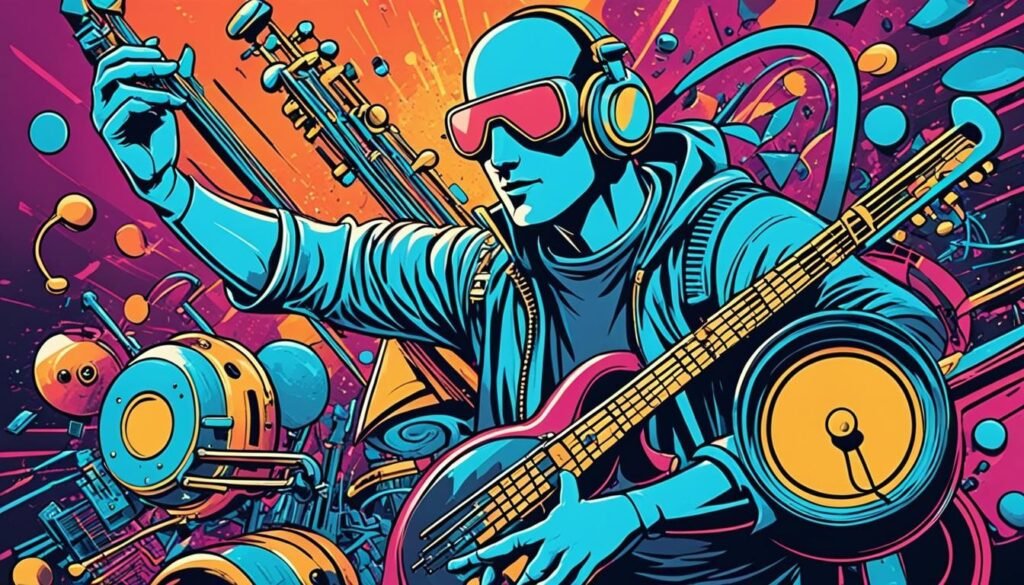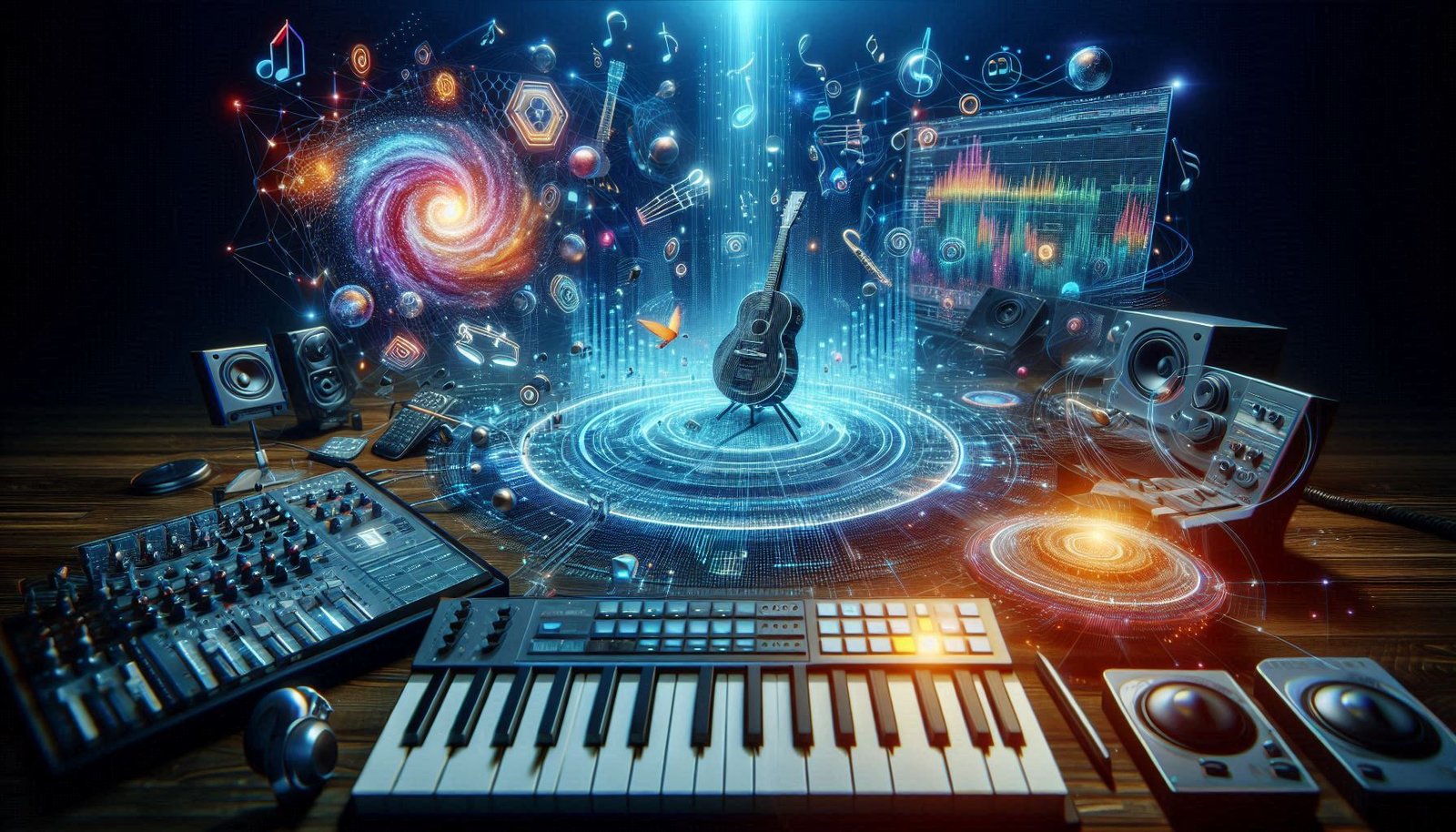
Artificial intelligence (AI) has been making waves across various industries, and the music world is no exception. In recent years, AI has significantly impacted the way music is created, composed, produced, and even performed. As technology continues to evolve, AI is pushing the boundaries of creativity, allowing musicians and producers to explore new sonic landscapes and revolutionizing the entire music industry.
In this article, we’ll explore how AI is transforming music creation, from assisting in composition and production to revolutionizing live performances, and how these developments are shaping the future of sound.
AI in Music Composition: Creating the Next Masterpiece
AI’s ability to compose music is one of its most fascinating applications. Traditionally, composing a piece of music required years of training and a deep understanding of music theory. Today, AI can assist composers in generating melodies, harmonies, and even entire compositions, significantly speeding up the creative process.
AI-driven tools like AIVA (Artificial Intelligence Virtual Artist) and Amper Music are prime examples of software that can compose original pieces of music. These AI platforms analyze vast amounts of existing music data, learning patterns, chord progressions, and stylistic elements from various genres. By doing so, they are able to generate new compositions that mirror the complexity and structure of human-made music.
AIVA, for instance, has even been recognized as a composer by a music rights society, with some of its works used in video games and film soundtracks. Similarly, Amper Music allows musicians to compose original tracks by selecting specific parameters such as mood, tempo, and instrumentation, helping artists create custom-tailored music in a matter of minutes.
While some argue that AI-generated compositions lack the emotional depth of human-created music, the use of AI as a tool to inspire creativity cannot be underestimated. AI can serve as a collaborator for musicians, offering fresh ideas and new perspectives on traditional compositional methods. As a result, it opens up possibilities for creative exploration that might not have been considered by human composers alone.
AI in Music Production: Streamlining the Process
The music production process, from recording to mastering, is another area where AI is having a profound impact. Traditional music production requires a team of experts, including sound engineers and producers, who spend countless hours fine-tuning a track to ensure it sounds polished and professional. AI is now streamlining these tasks, making high-quality music production accessible to a broader audience.
For instance, LANDR, an AI-driven mastering platform, enables musicians to upload their tracks and have them professionally mastered in minutes. The AI analyzes the track, adjusts the levels, and applies various effects to optimize the overall sound quality. This service has made mastering, a process once reserved for seasoned professionals, more affordable and accessible for independent artists.
AI is also being used to improve mixing techniques. Software like iZotope’s Neutron uses AI to analyze individual tracks within a mix, offering suggestions for how to adjust the EQ, compression, and panning. This technology allows producers to achieve a balanced mix more quickly, leaving them with more time to focus on the creative aspects of music production.
Moreover, AI-powered virtual instruments and plugins are becoming an essential part of modern studios. These tools can replicate the sound of traditional instruments or generate entirely new, futuristic sounds, expanding the palette of sonic possibilities for artists. AI-driven synthesizers, like Google’s Magenta Studio, allow musicians to create new sounds that are unique and innovative, providing inspiration for experimental genres.
While AI cannot replace the human ear’s nuanced judgment, its role as an assistant in the production process is undeniably valuable. By automating repetitive and time-consuming tasks, AI frees up musicians and producers to focus more on creativity, ultimately enhancing the quality and efficiency of the production process.
AI in Live Performances: Transforming the Stage Experience
AI is also making its way into live music performances, creating immersive and interactive experiences for audiences. Traditionally, live performances have relied on musicians’ improvisational skills and technical abilities to create memorable moments. AI is now adding a new layer of interactivity and innovation to these performances, allowing artists to push the boundaries of what is possible on stage.
One notable example is the use of AI in generating real-time visuals and soundscapes during live performances. AI can analyze the music being played and create dynamic visual displays that synchronize with the rhythm and tempo of the performance. This technology has been used by artists such as Holly Herndon, who incorporates AI-generated vocals and visuals into her live shows, creating a multi-sensory experience for her audience.
AI is also being used to enhance musical improvisation in real-time. For example, Shimon, an AI-driven robotic musician developed by Georgia Tech, can improvise alongside human musicians during live performances. Shimon analyzes the musical patterns and styles of the musicians it performs with and generates complementary melodies and rhythms, creating a collaborative performance between human and machine.
In addition to enhancing live performances, AI is being used to revolutionize music distribution and audience engagement. Virtual concerts, powered by AI and augmented reality (AR), allow artists to reach global audiences without the need for physical venues. Platforms like Wave XR enable musicians to perform live in virtual worlds, complete with AI-generated visuals and sound effects, providing fans with a unique and immersive concert experience.
As AI continues to evolve, the potential for live music performances is limitless. Artists can create entirely new forms of expression, blending music, technology, and visual art to create experiences that transcend traditional live performances.
AI’s Role in Music Discovery: Personalizing the Listening Experience
One of the most transformative impacts of AI in the music industry is its role in music discovery and personalization. Streaming services like Spotify, Apple Music, and YouTube Music have harnessed the power of AI algorithms to analyze users’ listening habits, preferences, and behaviors. These algorithms then curate personalized playlists and recommendations tailored to each listener’s unique tastes.
For instance, Spotify’s Discover Weekly playlist uses machine learning to analyze users’ listening history and generate a weekly playlist of songs that they are likely to enjoy. By studying patterns in the data, such as the genres, artists, and moods that a user frequently listens to, the AI can recommend new music that aligns with the listener’s preferences. This level of personalization has made music discovery more seamless and enjoyable for users, helping them find new artists and songs with minimal effort.
AI’s role in music discovery goes beyond recommending individual tracks. It is also being used to identify emerging trends and predict which artists or genres will become popular in the future. By analyzing streaming data, social media activity, and listener engagement, AI can identify patterns that may not be immediately apparent to humans. This data-driven approach to music discovery has become a powerful tool for record labels, producers, and artists, helping them stay ahead of industry trends and identify potential hit songs before they go mainstream.
Ethical Considerations: The Human Touch in AI-Driven Music
While the benefits of AI in music creation are undeniable, there are ethical considerations to address. Some critics argue that AI-generated music lacks the emotional depth and authenticity that human-made music offers. Music is often viewed as an emotional expression of human experience, and AI lacks the ability to feel or experience emotions in the way that humans do.
Additionally, there are concerns about the role of AI in replacing human musicians and producers. As AI becomes more advanced, there is a fear that it could lead to the devaluation of human creativity and artistry. However, many industry experts believe that AI should be viewed as a tool that enhances human creativity rather than replacing it.
AI’s impact on copyright and intellectual property is another area of concern. As AI-generated compositions become more common, questions arise about who holds the rights to these works. Should the rights belong to the programmer, the user of the AI, or the AI itself? These are questions that the music industry will need to address as AI continues to shape the future of music creation.
Conclusion: A New Era for Music Creation
AI is undeniably transforming the music industry, pushing the boundaries of what is possible in composition, production, and live performance. By automating time-consuming tasks and offering new creative tools, AI is enabling artists to explore new sonic landscapes and redefine the music-making process.
While AI’s role in music creation continues to evolve, it is important to recognize that human creativity remains at the heart of music. AI should be viewed as a powerful tool that enhances human ingenuity, allowing artists to push the limits of their craft and create music that resonates with audiences in new and exciting ways.
As we move into the future, the collaboration between human and machine will continue to shape the sound of music, opening up endless possibilities for artistic expression. Whether through AI-generated compositions, AI-assisted production, or AI-driven live performances, the future of music is bound to be as innovative as it is inspiring.
